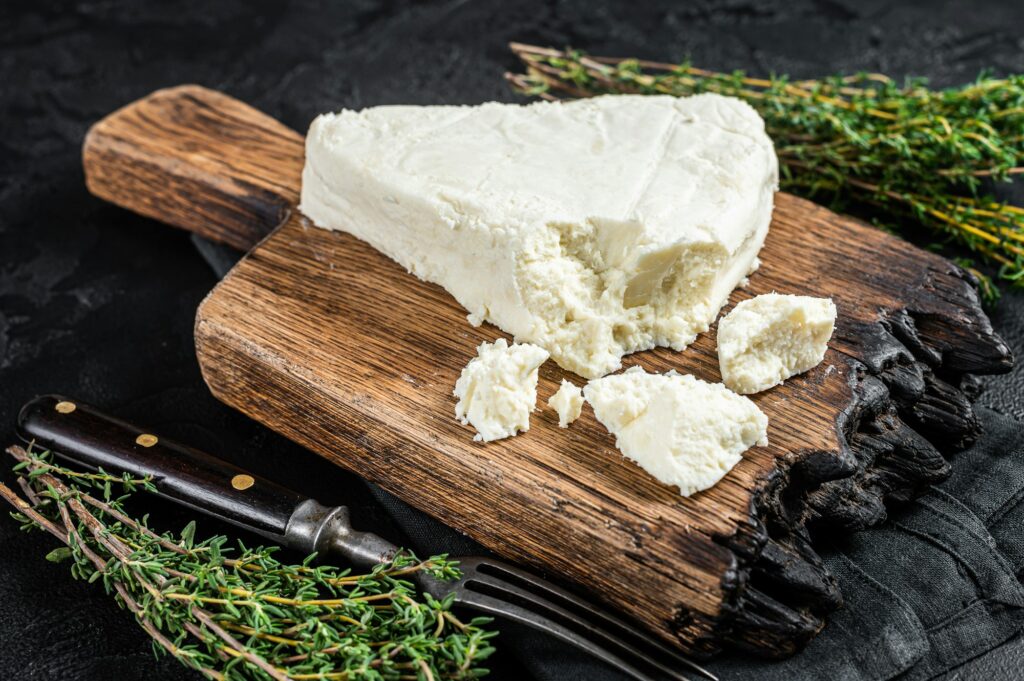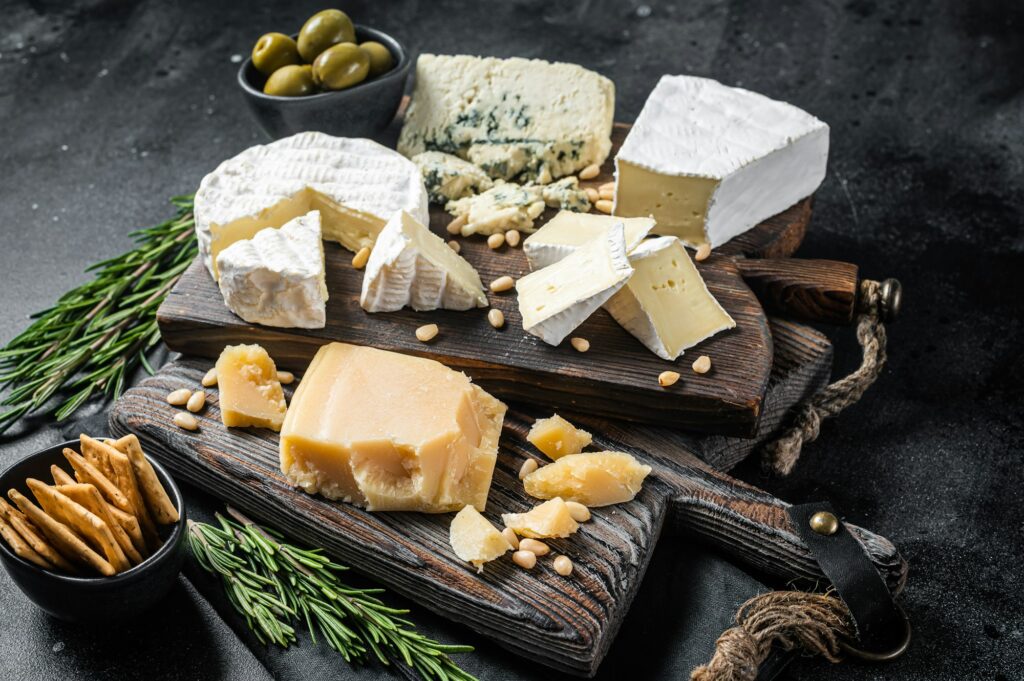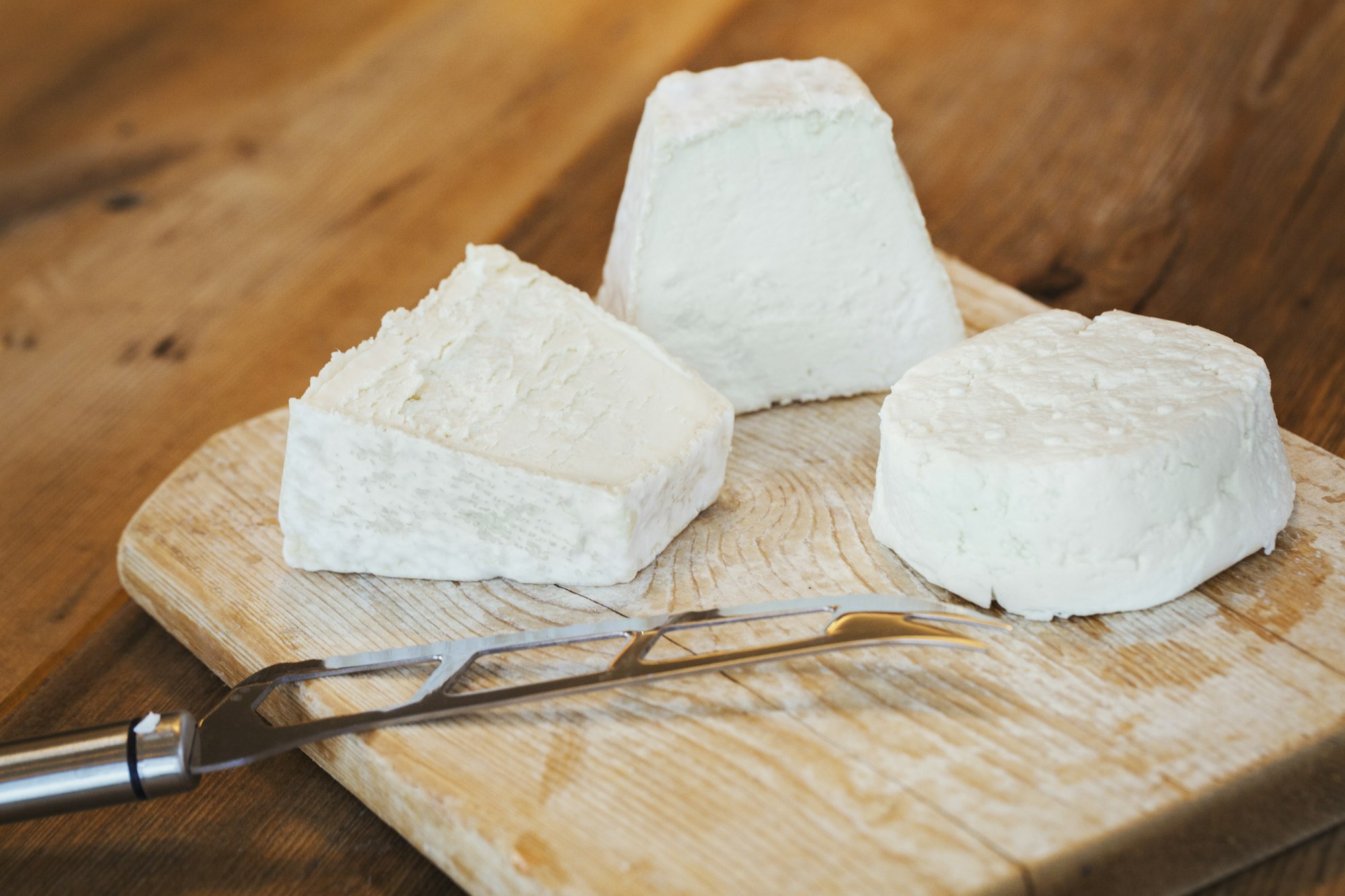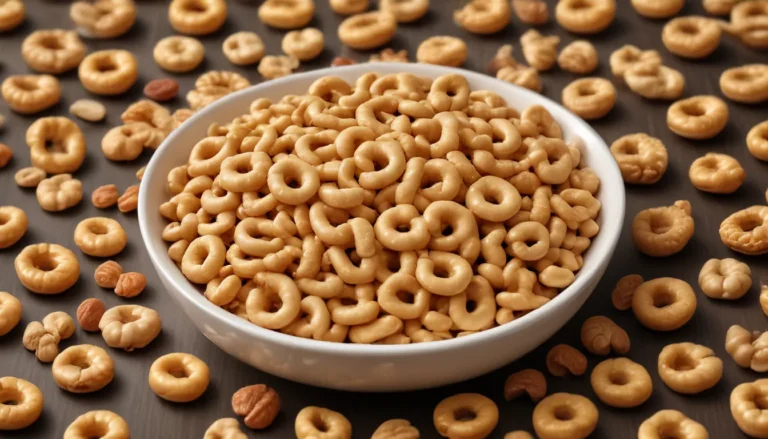The pictures in our articles might not always show exactly what the text is talking about. We use these images to make the article more interesting and eye-catching. They are there to add to the text, but not to replace it or show every detail.
Goat cheese has become a beloved culinary staple, known for its distinct flavor and versatility in various dishes. Made from the milk of goats, this tangy and creamy cheese not only excites the taste buds but also offers a plethora of health benefits. In this comprehensive guide, we'll explore the nutrition facts of goat cheese and why it might be a great addition to your diet.
What is Goat Cheese?
Goat cheese, also known as chèvre (French for "goat"), is a dairy product made from goat's milk. It has been a part of human diets for thousands of years, with evidence of goat domestication dating back to 8,000 BC. Goat cheese comes in various textures and flavors, from fresh and soft to aged and hard, making it a versatile ingredient in many cuisines worldwide.
Goat Cheese Nutrition Facts
Let's dive into the nutritional profile of goat cheese to understand why it's considered a healthy choice:
1. Calories
Goat cheese is relatively low in calories compared to many other cheeses. On average, one ounce (28 grams) of goat cheese contains about 70-80 calories. This makes it a great option for those watching their calorie intake while still wanting to enjoy the rich flavor of cheese.
2. Protein
Goat cheese is an excellent source of protein, with approximately 5 grams per ounce. This high protein content makes it a valuable addition to vegetarian diets and for those looking to increase their protein intake. Protein is essential for building and repairing tissues, making enzymes and hormones, and supporting overall health.
3. Fat Content
While goat cheese does contain fat, it's predominantly healthy fats, including heart-healthy monounsaturated fats. The fat content contributes to its creamy texture and helps with the absorption of fat-soluble vitamins. It's worth noting that the fat in goat cheese is typically easier for the human body to digest compared to cow's milk fat.
4. Vitamins
Goat cheese is rich in several essential vitamins:
These vitamins play crucial roles in various bodily functions, from maintaining healthy vision to supporting the nervous system.
5. Minerals
Goat cheese is packed with essential minerals:
This mineral content makes goat cheese a nutrient-dense food that supports overall health and wellbeing.
6. Lactose Content
Goat cheese typically contains less lactose than cow's milk cheese, making it a potentially better option for those with mild lactose intolerance. The lower lactose content is due to the unique composition of goat's milk and the cheese-making process.
7. Probiotics
Some varieties of goat cheese contain beneficial probiotics, which can support digestive health and boost the immune system. These friendly bacteria contribute to a healthy gut microbiome, which is increasingly recognized as important for overall health.
8. Conjugated Linoleic Acid (CLA)
Goat cheese contains CLA, a type of fatty acid that may have anti-inflammatory properties and potential benefits for weight management. Some studies suggest that CLA may help reduce body fat and increase lean body mass.
Health Benefits of Goat Cheese

The unique nutritional profile of goat cheese contributes to several potential health benefits:
9. Supports Bone Health
The high calcium and phosphorus content in goat cheese contributes to strong bones and teeth, potentially reducing the risk of osteoporosis. Regular consumption of calcium-rich foods like goat cheese can help maintain bone density, especially important as we age.
10. Aids Digestion
The lower lactose content and presence of probiotics in some goat cheeses can make it easier to digest for those with sensitive stomachs. This can be particularly beneficial for people who have difficulty digesting cow's milk products.
11. Heart Health
The potassium in goat cheese helps regulate blood pressure, while the healthy fats may contribute to overall cardiovascular health. Maintaining healthy blood pressure levels is crucial for reducing the risk of heart disease and stroke.
12. Weight Management
The protein content in goat cheese can help you feel fuller for longer, potentially aiding in weight management efforts. Protein-rich foods like goat cheese can help stabilize blood sugar levels and reduce cravings, making it easier to maintain a healthy weight.
13. Skin Health
The vitamin A content and healthy fats in goat cheese can contribute to healthy, glowing skin. Vitamin A is essential for skin cell turnover and repair, while healthy fats help maintain skin elasticity and hydration.
14. Immune System Support
The zinc and selenium in goat cheese play crucial roles in supporting a healthy immune system. These minerals act as antioxidants, protecting cells from damage and supporting the body's natural defense mechanisms.
15. Muscle Building
As a good source of protein, goat cheese can support muscle growth and repair, especially when combined with regular exercise. This makes it a valuable food for athletes and anyone looking to maintain or increase muscle mass.
Goat Cheese vs. Other Cheeses

To better understand the nutritional value of goat cheese, let's compare it to some other popular cheeses:
| Cheese Type (1 oz serving) | Calories | Protein (g) | Fat (g) | Calcium (mg) |
|---|---|---|---|---|
| Goat Cheese | 75 | 5 | 6 | 40 |
| Cheddar | 114 | 7 | 9 | 200 |
| Mozzarella | 85 | 6 | 6 | 143 |
| Feta | 75 | 4 | 6 | 140 |
| Brie | 95 | 6 | 8 | 52 |
As you can see, goat cheese is comparable to or lower in calories than many other cheeses while still providing a good amount of protein and essential nutrients.
Incorporating Goat Cheese into Your Diet
Goat cheese is incredibly versatile and can be used in various ways to add flavor and nutrition to your meals:
Choosing and Storing Goat Cheese
To get the most out of your goat cheese:
Potential Considerations
While goat cheese offers many benefits, there are a few considerations to keep in mind:
Frequently Asked Questions
Q: Is goat cheese healthier than cow’s cheese?
A: While both can be part of a healthy diet, goat cheese often has slightly less calories and fat, and may be easier to digest for some people due to its lower lactose content.
Q: Can people with lactose intolerance eat goat cheese?
A: Many people with mild lactose intolerance find they can tolerate goat cheese better than cow's milk cheese. However, it's best to consult with a healthcare provider and start with small amounts.
Q: Is goat cheese suitable for a keto diet?
A: Yes, goat cheese can be a good option for those following a ketogenic diet due to its high fat and protein content and low carbohydrates.
Q: How does goat cheese compare to plant-based cheese alternatives?
A: Goat cheese typically provides more protein and calcium than many plant-based alternatives. However, plant-based options can be suitable for those following a vegan diet or with dairy allergies.
Q: Can pregnant women eat goat cheese?
A: Pregnant women should only consume pasteurized goat cheese to avoid the risk of listeria. Always check the label or ask if you're unsure.
Conclusion
Goat cheese is not just a delicious addition to your meals; it's also a nutritional powerhouse. With its impressive protein content, essential vitamins and minerals, and potential health benefits, goat cheese can be a valuable part of a balanced diet. Whether you're looking to boost your calcium intake, trying to find a more digestible cheese option, or simply want to explore new flavors, goat cheese is worth considering.
Remember, as with any food, moderation is key. Incorporate goat cheese into your diet alongside a variety of other nutrient-rich foods for optimal health. And if you have any specific dietary concerns or health conditions, it's always best to consult with a registered dietitian or healthcare provider.
So, the next time you're at the cheese counter, why not give goat cheese a try? Your taste buds – and your body – might thank you for it!






